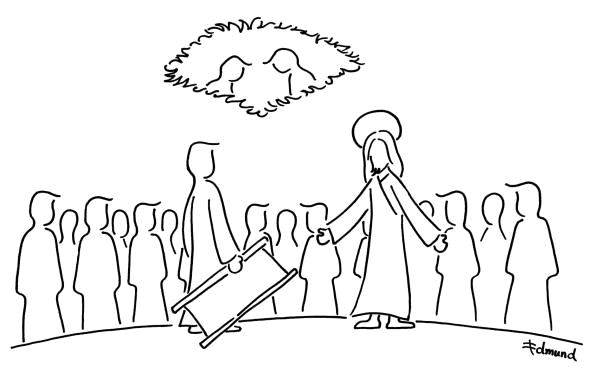From Where I Sit Judith Lynch (writing from Melbourne) Judith's website
February 18, 2012
Looking for the cracks Judith's previous articles
When
those four brawny fellows let their sick mate down through the roof to land slap
bang at Jesus’ feet
(can’t you just imagine his face!) Jesus responded with a “Son, your sins
are forgiven”.
Whose
sins? Those committed by the poor fellow on the stretcher?
Or the sin of those in the crowd who selfishly blocked the doorway. Maybe
the ostentatious Pharisees there to catch Jesus out. Maybe all of them, because
as a people they marginalised the sick and misfits of their communities.
Jesus would have been very conscious of all that because he had just
spent a tiring day in their company.
In today’s culture sin isn’t exactly a
gripping topic. Like the
crowd gathered around Jesus, we have been conditioned to think of sin in terms
of personal actions – theft, adultery, lying, violence. When my
daughter was preparing to be confirmed I suggested she consider revisiting the
sacrament of Reconciliation as part of her preparation. She looked somewhat
pityingly at me before responding, “I don’t make sins, I just make
mistakes.”
That’s true when you are a child, but we
aren’t. There’s personal sin and then there’s sin that needs to be seen in
a wider context, what John calls “the sin of the world”. We are adults in a
world community where most are excluded from both the dining table and the
decision table. Affluence is concentrated in the business centres of the world
while billions lack basic necessities like clean water. Each day 30,000 children
under five die from preventable causes. Millions of young adults are jobless.
Women and children starve while we ponder weight reducing diets. Children are
deprived of education so that their labour can feed western society’s appetite
for ever new, ever more. Poverty is a moral problem, a basic problem, and it is
said that it is the great sin of our time.
But if that all seems a little distant from
our Australian everyday, then consider the land we live in. Many
of us have not learnt to live in respectful harmony with the Australian climate
and landscape. We waste water trying to keep a northern hemisphere lawn green
under a hot Australian sun. In the name of economy new homes are skimping on
verandahs and other energy efficient climate control measures and installing air
conditioners instead.
Since
I moved to a bushfire prone area, just fifteen minutes away from an area
that was devastated by bushfire, I have become much more environmentally aware.
Some of that is fear because I don’t want to lose my home to bushfire. But my
home could be replaced. Not so the giant trees that have been here for
generations or the lorikeets that nest in the ghost gum. These treed hills
breathe for Melbourne, they are the lungs of a city. The people who live here
have a responsibility to respect that land and let it tell them how it should be
lived in.
Is
environmental carelessness sinful? Is over consumption of material goods, water
and electricity sinful? These are hard questions, personal questions and we’re
just learning to ask them. If our faith is to grow then we need to leave behind
our limited, childhood and maybe adolescent perceptions of what sin is.
We are a sinful people. We don’t properly
appreciate that with God’s gifts come responsibilities. What’s encouraging
is the fact that God never gives up on us. It reminds me of the Leonard
Cohen song called “Anthem” that
repeats the refrain:
There is a crack in everything
That's how the light gets in.
If
the door is blocked there is always the roof. From where I sit it seems to me
that God looks for the crack in us to let in the light of awareness followed by
forgiveness, if we allow it.